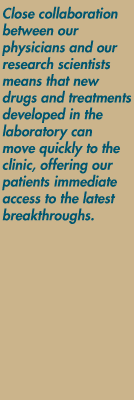The Clinical Breast Cancer Program at UC Davis Cancer Center provides comprehensive, multidisciplinary care for patients with all types and stages of breast cancer. Patients receive all of their care on one campus, from a team of top academic physicians who specialize in breast cancer. Last year, more than 1,300 breast cancer patients from more than 35 counties came to UC Davis Cancer Center for their treatment.
Specialists
Specialists in different aspects of breast cancer treatment – medical oncology, radiology, surgical oncology, pathology, radiation oncology and plastic and reconstructive surgery – collaborate to design the best treatment plan for each patient. Our multidisciplinary team also includes genetic counselors, dietitians, pain medicine specialists, oncology nurses, oncology pharmacists, clinical trial associates, social workers, patient educators and art therapists.
Services
New patient orientations specifically for breast cancer patients, funded by the Susan G. Komen Breast Cancer Foundation
- Breast cancer support groups
- "Learn at Lunch" workshops for patients, their families and caregivers
- Cancer Resource Center
- Psychosocial counseling
- Writing as Healing workshops
- Triumph fitness classes
- "Look Good – Feel Better," an American Cancer Society program held at UC Davis Cancer Center
Clinical trials
UC Davis Cancer Center is a large clinical trials network, offering breast cancer patients access to the newest drugs and pioneering therapies, often long before they become widely available.
Research
Close collaboration between our physicians and our research scientists means that new drugs and treatments developed in the laboratory can move quickly to the clinic, offering our patients immediate access to the latest breakthroughs.
For example, our surgeons were among the first in the country to pioneer a treatment known as non-surgical lumpectomy, or radiofrequency ablation. This investigational treatment employs heat to destroy small, early stage breast cancers and our scientists are developing a new CT breastimaging machine that may detect tumors earlier than standard mammography.
Our physicians also conduct research that advances clinical care. For example, a team of UC Davis surgical oncologists, including James Goodnight, professor and chair of the Department of Surgery, recently published a study in the Annals of Surgical Oncology reporting that sentinel node biopsy is more sensitive than axillary lymph node dissection at identifying cancer that has spread to the lymphatic system.


